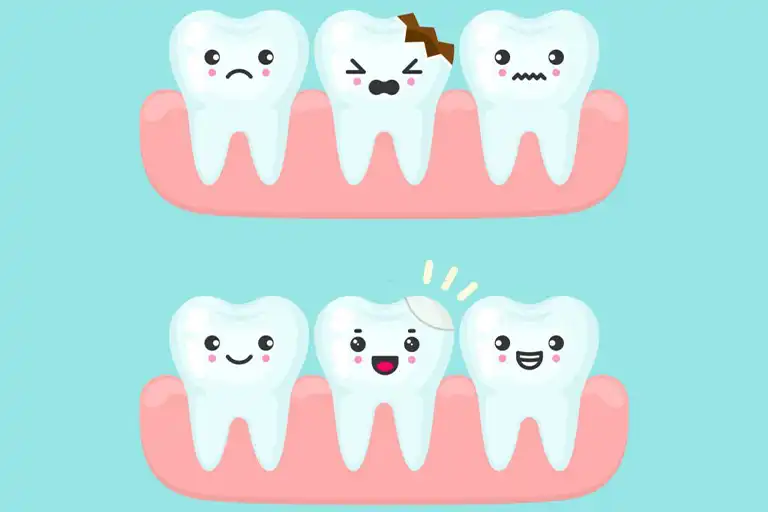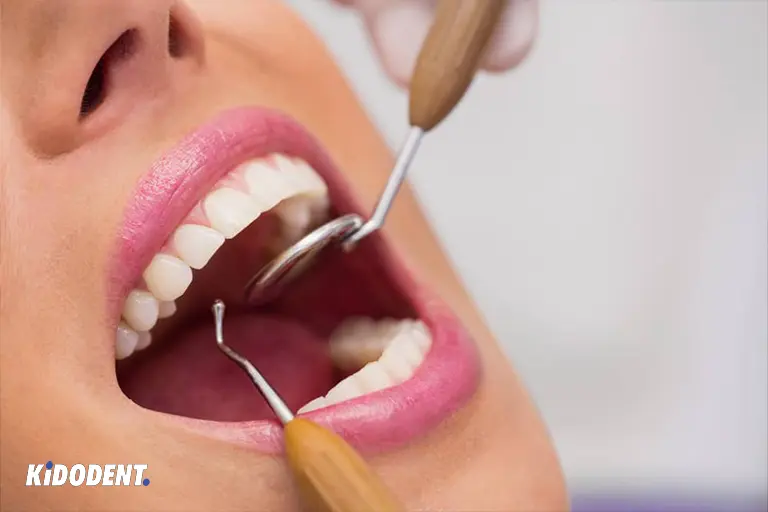Composite dental bonding, or teeth bonding, is a popular cosmetic procedure that improves the function and appearance of teeth. With many benefits and uses, some people may wonder if a composite bonded tooth breaks or chips. In this article, we will explain what may cause dental bonding to get damaged and what you can do to protect your tooth once your bonded tooth chips and falls off.
What is teeth bonding?
Teeth bonding is a less invasive and relatively quick procedure where dentists use tooth-colored composite resin material to fix chipped, cracked, or broken teeth. It is used in closing the minor gaps between teeth and covering discoloration and staining.
Composite bonding provides a highly beautiful and natural smile appearance. It is almost undetectable from natural tooth structure, making it one of the most popular cosmetic dental procedures.
The process of teeth bonding can generally take 30 to 60 minutes per tooth to complete. This involves several steps. First, the damaged tooth is cleaned and prepared. Your dentist then applies the bonding agent to help the composite adhere to the tooth surface. Next, your dentist applies composite resin to the tooth and uses a special light to harden the material.
Finally, the composite is shaped and sculpted to achieve the best contour for your tooth. The last part of your treatment involves polishing the composite. This gives a natural shiny look to your tooth or teeth which will transform your smile.
Does a composite bonding break easily?
This is a fact that composite resin material used in dental bonding is not as strong as your natural tooth enamel. Nor is it compared to porcelain veneers and other tooth-colored materials used in dental crowns. Teeth bonding can chip or break especially with frequent teeth grinding or when biting down or chewing on hard foods.
However, if a composite falls out or breaks, this is usually not a big deal. It can easily be repaired in a single dental appointment.
Certain factors can affect a bonded tooth to break and chip, such as:
Injuries or habits
A bonded tooth can get damaged or broken if a person bites down on hard things or when experiencing trauma to the tooth, such as mouth injuries during playing sports or doing other activities. Also, having habits like teeth grinding or nail biting can all cause your bonding to wear down or chip off sooner than you expected.
Poor oral hygiene
Not taking care of your teeth will lead to the development of tooth decay, which directly affects the bonding. Inadequate brushing or flossing and consuming highly-pigmented or high-sugar foods and drinks damage your natural teeth as well as the composite bonding.
All these risk factors can cause the bonding to get stained, weaken the bond between your natural teeth and bonding material, and eventually make it prone to breakage.
The type of material used
Obviously better-quality composite will last longer than poor-quality material. Composite is available in different shades to match natural teeth. Although it is not as durable as ceramic, using the right composite combination and the quality of the material will affect its longevity.
An improperly made dental bonding
Although dental bonding is a simple procedure, it is a technique sensitive for dentists. An improper bonding procedure—whether it doesn’t match the opposing teeth, is too high, or is not bonded well— is surely more prone to damage.
It is important to choose a dentist you trust to ensure a more long-lasting composite bonding treatment.

How long does bonding last?
On average, dental bonding can last between 5 to 8 years. If you do more care and practice good oral and dental health, you can increase the lifespan of bonded teeth significantly.
In fact, composite bonding teeth require more frequent touch-ups and repair once you are not careful around them.
What to do if your composite bonding break or cracks?
Dental bonding can fall out or chip such as due to trauma, poor oral hygiene, or simply longtime wear and tear. If that happens, don’t worry. Fortunately, composite bonding is easily replaced and fixed.
So, visit a dentist and have it fixed ASAP to prevent the risk of infection and any upcoming discomfort. Here are steps to take when experiencing composite bonding break or falling.
Contact your dentist
If your teeth bonding falls out or cracks, you should make an appointment and see your dentist as quickly as possible. Your dentist will either replace the bonding or repair it.
With the loss of bonding or chipping, some areas of your tooth can be exposed to bacteria. Leaving the area unprotected for a longer time will cause infection in the underlying tooth.
Unlike other restorative treatments which are mainly laboratory-processed, composite bonding is a direct-method restoration. This means that a dentist rebuilds, reshapes, and restores the deficient tooth to its full function all directly without requiring multiple visits or lab work.
The video below will show you how a dentist fixes a chipped tooth using bonding treatment.
Do not try to pull off the loose composite bonding break
If your bonding is loose and there are some parts still connected to the tooth, don’t try to pull it completely off. Hold it on until you see your dental professional. Pulling or trying to detach the remaining broken bonding can damage your tooth and result in sensitivity or pain.
Clean your teeth and prevent further damage
If your composite bonded tooth has fallen off or is damaged in some way, it is best to keep the area clean and avoid chewing anything that could damage it more. Make sure you brush gently around the area so that the bacteria will not build up.
This is what you can do until you schedule an appointment and let your dentist examine and fix the issue.
How to protect your bonded teeth?
There are many advantages to composite bonding. In fact, it is an effective and affordable procedure which might be the best option depending on your dental condition and needs. Therefore, help your composite bonded teeth stay strong and healthy.
Here are some fundamental caring tips to protect your bonding:
- Brush your teeth at least twice a day and floss daily. Be sure to brush and floss gently and thoroughly. Maintaining good oral health with daily brushing and flossing will help keep your teeth and gums healthy.
- Be specifically careful about eating and biting down on hard foods. Avoid very sticky, hard, and chewy foods that could damage the bonding.
- Avoid teeth grinding and chewing on ice or hard items like pens. Talk to your dentist to get a mouthguard if you are a teeth grinder.
- Visit your dentist regularly for check-ups and professional teeth cleaning. During these visits, your dentist will check your teeth and gums as well as the condition of the composite bonding for any sign of cracks or chips.
